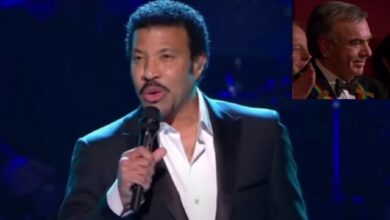Priscilla Says Elvis Pours His Emotions Into This Song
Elvis Presley, often referred to simply as Elvis, was a cultural phenomenon whose influence extends far beyond the realm of music. Born in a small, modest home in Tupelo, Mississippi, he grew up in a working-class family that deeply valued both faith and hard work. From a young age, Elvis was inspired by a variety of musical genres, including gospel, blues, and country, which would all later blend seamlessly into the rock and roll sound that he would make famous. His earliest musical influences came from the radio and the local church, where he was exposed to the deep emotional resonance of gospel music.
As a teenager, Elvis’s family moved to Memphis, Tennessee. It was here that he truly fell in love with music and began to explore his talent more seriously. In 1953, after graduating from high school, he recorded a demo at Sun Studio, where he would soon begin to capture the attention of local audiences. Elvis’s unique style, characterized by its passionate vocal delivery and energetic rhythm, set him apart in a burgeoning music scene that was ripe for a revolutionary change. His first major hit, “That’s All Right,” released in 1954, is often credited with launching the rockabilly craze and establishing him as the “King of Rock and Roll.”
Throughout the 1950s, Elvis quickly became a household name. His appearances on television shows such as “The Ed Sullivan Show” brought him into the living rooms of millions, showcasing not just his music but also his charismatic and provocative stage presence. The iconic “shaking hips” and suggestive movements stirred both excitement and controversy, drawing attention from fans and critics alike. Indeed, Elvis’s combination of innocence and raw sensuality made him a complex figure in American culture; he was beloved by young fans while simultaneously being scrutinized by parents and conservative groups.
Despite his immense popularity, Elvis faced several challenges throughout his career. The pressure of fame, alongside personal struggles, led to periods of withdrawal and contemplation. By the 1960s, he somewhat retreated from live performances, focusing instead on his film career, which yielded a string of successful movies. However, these films often received mixed reviews, and by the time he entered the later part of the decade, Elvis found himself at a crossroads, seeking a resurgence of both personal and professional relevance.
The “68 Comeback Special” is widely viewed as a triumphant return for Elvis, allowing him to reconnect with his musical roots and prove his mettle as a live performer. The special not only showcased his timeless appeal but also introduced a new generation to his artistry. The emotional depth of his performance of “If I Can Dream,” in particular, reflected the social consciousness of the time. The song emerged as a beacon of hope amid the civil rights movement and widespread social change, with its lyrics echoing the longings for peace and unity in a divided America.
The pathos behind Elvis’s performance was further enhanced by the elaborate production, featuring a full orchestral backing and gospel choir. This combination elevated the song from mere entertainment to a powerful statement, resonating with viewers who were grappling with their own hopes and aspirations amid the tumult of the late 1960s. Elvis’s ability to convey deep emotion through his voice lent authenticity to the lyrics, making them not just words, but a shared vision for a better future.
Elvis’s subsequent performances in the years following the “68 Comeback Special” showcased his adaptability as an artist. He embraced new trends while remaining true to the rock and roll style that first brought him acclaim. His concerts became legendary events, attracting a devoted fan base that spanned generations and cultures, reinforcing his status as an undeniable icon.
In the years leading up to his untimely death in 1977, Elvis continued to push boundaries both musically and culturally. His influence can be seen in myriad artists who followed in his footsteps, drawing inspiration from his innovative style and unparalleled energy. Artists from various genres—rock, pop, country, and R&B—credit him as a primary inspiration, and his music remains a foundational influence in contemporary music.
In retrospect, Elvis Presley’s legacy is felt not only through his catalog of hits but also through his role in shaping popular music and culture. He broke down racial barriers, introduced new musical forms, and redefined the concept of a rock star. The imagery of Elvis—the slicked-back hair, flashy outfits, and signature sneer—has become a part of American cultural history, representing an era filled with rebellion, excitement, and change.
Ultimately, Elvis’s message of unity, love, and hope resonates as strongly today as it did during his lifetime. “If I Can Dream,” with its profound lyrics and heartfelt delivery, remains not just a defining moment in his career, but a universal call for a better world—a dream that, like Elvis, will continue to inspire countless individuals for generations to come. Elvis Presley may have left us, but his spirit, creativity, and vision endure, solidifying his place as an eternal king in the realm of music and beyond.





